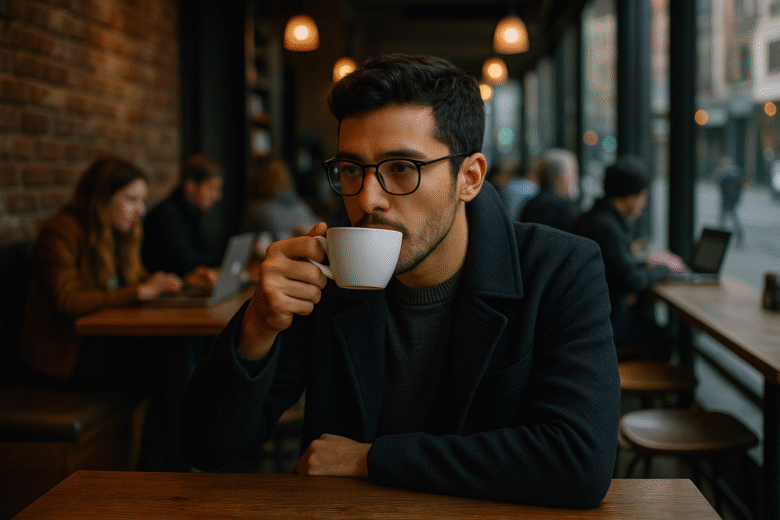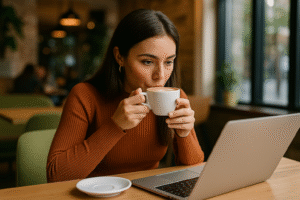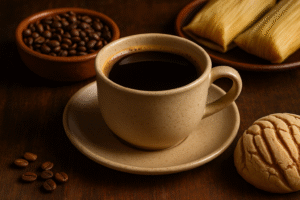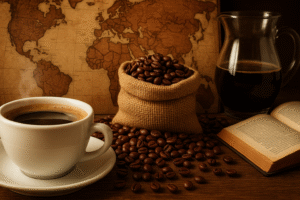In the ever-changing rhythm of urban life, coffee is more than a drink. It’s a symbol of place, routine, identity, and belonging.
Across cities worldwide, coffee has evolved into a cultural anchor—a small but powerful part of how people connect with themselves and their communities.
Urban environments can be overwhelming, fast, and fragmented. Yet coffee offers a pause, a rhythm, and a sense of familiarity. Whether it’s a corner café or a morning espresso ritual, coffee helps define who we are and how we fit into the fabric of city life.
Coffee Shops as Third Places
Sociologist Ray Oldenburg coined the term “third place” to describe spaces that are not home (first place) or work (second place) but are essential for community life. Coffee shops have emerged as one of the most popular third places in urban settings.
These spaces offer a sense of welcome without obligation. You don’t have to buy much, stay long, or know anyone. Yet you still feel part of something.
In dense cities where public space can be limited, the coffee shop becomes an oasis of semi-private belonging. It’s where people read, meet, work, or simply exist without pressure.
Personal Identity and Coffee Choice
In urban culture, coffee choice often says something about the individual. A black Americano may suggest minimalism or seriousness. A colorful iced latte might reflect playfulness or creativity.
How people order, where they buy, what brands they support—all become subtle identity markers.
People craft rituals around their coffee that reflect personal values: sustainability, aesthetics, convenience, tradition. It’s not just about taste—it’s about expression.
Coffee becomes a daily decision that signals how someone navigates their world.
Café Style and Cultural Affiliation
Coffee shops themselves also carry identities. A rustic café with reclaimed wood and pour-overs feels different from a sleek espresso bar with industrial lighting.
These styles appeal to different demographics and lifestyles. Artists, tech workers, students, and retirees all find cafés that mirror their personalities.
By frequenting a certain space, people associate themselves with its values and aesthetics.
Some cafés even become micro-communities, where regulars recognize each other and staff know customers by name and order.
Belonging Through Ritual
In the urban sprawl, routine becomes a form of stability. Stopping at the same café, being greeted with familiarity, or knowing the barista’s rhythm all reinforce a sense of place.
Even a solitary ritual—making coffee at home before commuting—creates psychological grounding.
These small, repetitive acts form a thread of consistency in cities that are otherwise in constant flux.
They offer control, presence, and meaning in a noisy environment.
Digital Nomads and Portable Coffee Culture
For remote workers and digital nomads, coffee shops often double as mobile offices. These individuals carry their routines across cities and countries, but coffee remains the constant.
Laptop-friendly cafés, Wi-Fi access, and a plug near the table become essential criteria for choosing where to work.
For these workers, coffee shops are not just about caffeine—they’re about productivity, environment, and belonging while in transit.
The connection to place happens through coffee, even when the city itself is unfamiliar.
Coffee and Gentrification
Coffee is also a symbol in the conversation about urban change and gentrification.
New cafés often signal shifts in a neighborhood—both economically and culturally. They can bring community and vibrancy, but also displacement and cultural erasure.
For some, the arrival of a new coffee shop means progress. For others, it means loss.
Understanding the role coffee plays in neighborhood identity is essential. Thoughtful cafés engage with their communities rather than replace them.
Community Events and Social Engagement
Many urban cafés host open mic nights, language exchanges, art shows, or social justice events. These gatherings turn a commercial space into a civic one.
They create opportunities for dialogue, discovery, and relationship-building.
Such events help reinforce a café’s identity and expand its reach beyond just drinks.
They also offer people the chance to meet others with shared values in a comfortable, accessible setting.
Coffee as a Cultural Equalizer
In urban settings with extreme diversity—across race, age, profession, and income—coffee can be a shared experience.
It breaks down barriers. It’s something almost everyone engages with in some form.
Standing in line for coffee or sharing a table in a packed café puts people in proximity they might not otherwise choose.
This shared space, even without interaction, promotes coexistence and empathy.
Branding, Social Media, and Urban Identity
In cities, coffee is often part of personal branding—especially on social media. Aesthetic café visits, stylized coffee shots, and tagged locations all help shape digital identity.
People share not only what they’re drinking but where they’re drinking it. That location becomes part of their urban map—the spaces they claim and project.
Coffee shops know this and design accordingly. Some cafés have become Instagram-famous, drawing customers for the setting as much as the brew.
Urban Coffee Trends and Innovation
Urban centers are hubs for experimentation. Trends like nitro cold brew, mushroom lattes, and plant-based milks often start in cities before going mainstream.
Cafés compete not only on flavor but also on creativity, service, and experience.
Baristas act as storytellers, educators, and trendsetters—shaping how the next generation engages with coffee.
Innovation in urban cafés reflects the broader creative energy of the city.
Coffee and Mental Health
In the isolation and overstimulation of city life, coffee provides comfort and mental support.
The act of making or drinking coffee becomes a grounding ritual. It signals safety, familiarity, and self-care.
For many, the café is a place of peace—where noise softens, time slows, and breathing deepens.
It’s not about escape but restoration—a moment to recharge within the chaos.
Conclusion: A Small Cup with a Big Role
Coffee in urban life is much more than fuel. It’s identity, it’s rhythm, it’s belonging. It shapes how people interact with their environment and each other.
It offers a sense of control in the unpredictable. A chance to connect in the disconnected. A reminder of humanity in the mechanical flow of the city.
Whether taken to-go or savored slowly, coffee helps define who we are in the places we call home.
In cities that never sleep, it’s the quiet ritual that keeps us grounded.

Marcio Luzardo is a coffee enthusiast and the voice behind Tudo Viraliza. With a passion for turning curiosity into practical knowledge, he shares easy-to-follow tips, guides, and insights to help readers enjoy better coffee every day. When he’s not writing, Marcio is exploring new brewing methods or diving into the rich stories that connect coffee to culture, lifestyle, and wellness.



